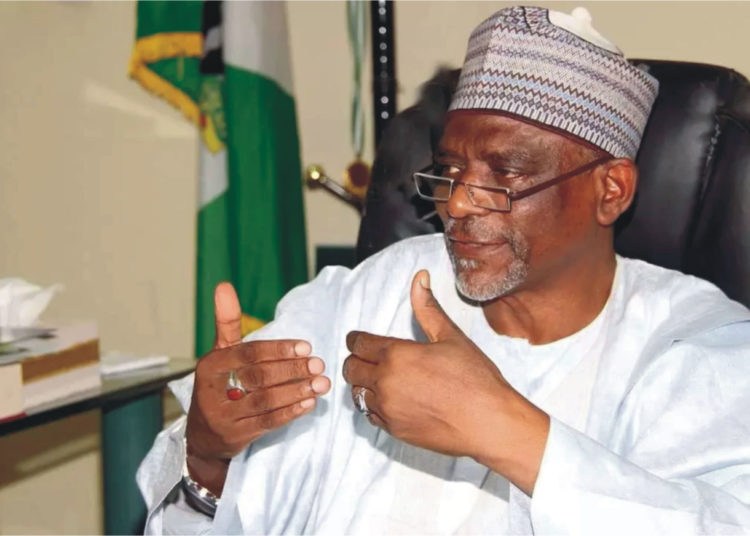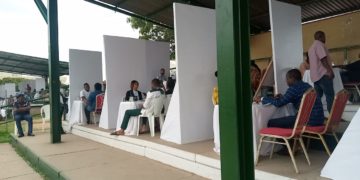The federal government has blamed its inability to negotiate with university lecturers on insistence by the Academic Staff Union of Universities (ASUU) that they must be paid salaries for the six months they had been on strike.
Minister of Education, Adamu Adamu, disclosed this to State House correspondents yesterday during the weekly ministerial briefing organised by the presidential communications team at the presidential villa.
According to him, President Muhammadu Buhari rejected the demand outrightly when he presented the report to him.
“All contentious issues between the government and ASUU had been settled except the quest for members’ salaries for the period of strike, a demand that Buhari has flatly rejected,” he said.
The minister said the president’s position had been communicated to the lecturers who are expected to call off the strike.
He stated that the rejection was to curb the excesses of trade unions that want to be paid for work not done.
Adamu said the University Transparency and Accountability Solution (UTAS) payment system proposed by ASUU has outscored the Integrated Payroll and Personnel Information System (IPPIS) already in use by the government, which the lecturers are kicking against.
He also said IPPIS has been updated to now accommodate payment of those on sabbatical.
“Just one thing that I was reminded of is that even the current IPPIS has been made to accommodate sabbatical. I didn’t know this. Somebody just told me,” Adamu noted.
The lecturers had accused the federal government of not taking into consideration the peculiarities of tertiary institutions in the IPPIS.
But Adamu also debunked the report that UTAS had not been approved by government as the payment platform for university lecturers.
He said the government has proposed a new salary to the unions which he said the Senior Staff Association of Nigerian University (SSANU), the Non-Academic Staff Union of Universities and Allied Institutions (NASU) and the National Association of Academic Technologists, (NAAT), have accepted in principle and are now consulting with their members with a view to calling off the strike in the next one month.
He, however, commended the Academic Staff Union of Polytechnics (ASUP) for calling off its own strike.
He said the federal government has invested over N2.5 trillion in tertiary education in the last ten years, exceeding the sum of N1.2 trillion ASUU is demanding.
The minister also said it is the responsibility of ASUU to compensate students for the time wasted by the six-month strike, not the federal government.
Adamu suggested that the affected students should “take ASUU to court” to claim for damages incurred over strike period.
He said the federal government bears no liability to compensate millions of students grounded for six months over lost time, saying if the students are determined to get compensated, they should take ASUU to court.
The minister said it is important for the public to be aware that “the federal government is paying the salaries of every staff in its tertiary institutions, academic and non-academic staff, while these institutions are also in full control of their internally generated revenue (IGR).
“We are doing everything humanly possible to conclude the negotiations. It is our hope that the outcome of the renegotiations will bring lasting industrial peace to our campuses. In the meantime, I am sure that the current efforts would yield the desired results and return our children back to school.”
Adamu also called for crackdown on perpetrators of examination malpractice, which he said had been uncovered as a cartel.
He called on the examiners to work closely with law enforcement agencies to “crackdown on examination malpractice”.
According to him, despite efforts to raise the integrity of the examination system in schools nationwide, the ministry still grapples with malpractice perpetrated both at the exams councils and school levels.
The minister also said the Buhari administration has spent a total of N6,003,947,848,237 in capital and recurrent expenditure in the education sector in the last seven years.
He said this was in addition to interventions from TETFund and UBEC, amounting to N2.5 trillion and N553,134,967,498 respectively in capital investment.
He noted: “We must also note and appreciate the huge investments from States and the private sector at all levels of our educational system. We will continue to improve on the implementation of the Ministerial Strategic Plan (MSP) all through to 2023 for the overall development of the education sector and the Nigerian nation.
“We will continue to create the necessary enabling environment to attract more and more private sector investment. We shall hand over a better education sector than we met.”
Adamu said the number of out of school children has dropped from an estimated 13 million to 6.9 million, with an impressive enrollment from online states of Kano, Kaduna, Katsina, Sokoto, Gombe, Bauchi, Adamawa, Taraba, Rivers and Ebonyi.
He linked the increased enrollment to activities of the Better Education Service Delivery for All (BESDA).
We’ll Sue FG, Not ASUU For Damages, NANS Tells Minister
But the National Association of Nigerian Students (NANS) said it will sue the federal government over liabilities incurred as a result of the ongoing industrial action by the Academic Staff Union of Universities (ASUU).
NANS president, Comrade Sunday Asefon, stated this yesterday while reacting to a statement attributed to the Minister of Education, Malam Adamu Adamu, suggesting that Nigerian students affected by ASUU strike must sue the Union for damages.
Asefon said it is an abuse of intellect to suggest that students should sue employees for protesting bad working conditions and not the employer who is the proprietor of schools and the beneficiary of the exorbitant school fees they pay.
The students’ body said, “Perhaps, the only thing Malam Adamu Adamu has gotten right since he became a minister is the fact that Nigerian students needed to be compensated for their wasted time, opportunities and resources.
“However, the minister is clever by half by suggesting ASUU should be held liable for the liabilities. ASUU is neither the proprietor of our tertiary institutions nor the beneficiary of the exorbitant fees we pay across our tertiary institutions in Nigeria.
“Since Nigerian students do not think like the minister, since we can separate what is right from wrong, we will yield to the advice of the minister by exploring legal windows for compensation of our students for numerous liabilities suffered as a result of the incessant and prolonged ASUU strike.
“While our losses in terms of lost opportunities as a result of time wasted might not be quantifiable, our losses as regards private hostel accommodations payments, research work losses, foreign admission losses, extra year resulting in missing of NYSC service opportunity are liabilities that can be quantified and liabilities accounted for.
“We have therefore decided to take the advice of the minister to seek legal redress for the liabilities suffered. We will therefore consult with our legal advisers to see what options are available for us to explore legally against the federal government and minister of Education”.
NANS however called on ASUU to be considerate and put students’ interest in their consideration, saying trying to hold the nation to ransom is unpatriotic and self-serving.
The NANS president said,”We therefore advise state governments whose tertiary institutions are on strike to take every reasonable measure to ensure resumption of academic activities, as the current strike should never have affected state universities.
“We will support state governments in any measure they deem fit to compel striking state university lecturers to resume work”.
Why We Rejected FG’s Salary Structure – ASUU
Meanwhile, the Academic Staff Union of Universities (ASUU) yesterday explained why it rejected federal government’s offer of academic salary structure.
At the resumed meeting of the federal government and ASUU 2009 Agreement Re-negotiation Committee on Tuesday, the government team had presented an “award” of a Recommended Consolidated University Academic Salary Structure (CONUASS) prepared by the National Salaries, Incomes and Wages Commission (NSIWC) to ASUU.
But in a press statement yesterday signed by ASUU president, Prof Emmanuel Osodeke, the Union firmly rejected the “award”.
Osodeke said the 1981 FG-ASUU agreement, under the Shehu Shagari administration, had established the principle of collective bargaining based on the Wages Boards and Industrial Council’s Decree No 1 of 1973, the Trade Dispute Act (1976), ILO Conventions 49 (1948), 91(1950), 154 (1988) and recommendation 153 (1981), Udoji Commission Report of 1974, and Cookey Commission Report of 1981.
He noted: “It also provided a platform for resolving such important issues as special Salaries and Conditions of Service of University Staff, University Funding, roles of Pro Chancellors, Vice-Chancellors, and National Universities Commission (NUC). A key outcome was a special salary scale for university staff known as University Salary Structure (USS).
“At the commencement of the renegotiation of the 2009 FGN/ASUU Agreement on 16th March 2017, both the Federal Government and ASUU Teams agreed to be guided by the following principles as their terms of reference which includes, reversal of the decay in the Nigerian University System, in order reposition it for its responsibilities in national development.
“Reversal of the brain drain, not only by enhancing the remuneration of academic staff, but also by disengaging them from the encumbrances of a unified civil service wage structure; (iii) Restoration of Nigerian Universities, through immediate, massive and sustained financial intervention; and ensuring genuine university autonomy and academic freedom.
“Government’s surreptitious move to set aside the principle of collective bargaining, which is globally in practice, has the potential of damaging lecturers’ psyche and destroying commitment to the university system. This is, no doubt, injurious to Nigeria’s aspiration to become an active player in the global knowledge industry.
“Rejecting a salary package arrived at through collective bargaining is a repudiation of government’s pronouncements on reversing “brain drain”. It is common knowledge that, more now than in the 1980s and 1990s, Nigerian scholars, especially in scarce areas like science and medicine, are migrating in droves to Europe, America and many parts of Africa such as South Africa, Rwanda, and Ghana with supportive environment to ply their trades as well as competitive reward systems for intellectual efforts. Does the Nigerian government care about what becomes of public universities in another five or ten years if this trend continues?”
Osodeke further noted that federal government’s repudiation of collective bargaining is in bad faith and a retrogressive step for a democratic government to abrogate the collective bargaining principle after more than 40 years of its introduction into the Nigerian University System.
He added: “Government imposed the ongoing strike action on ASUU and it has encouraged it to linger because of its provocative indifference. The Munzali Jibril-led renegotiation committee submitted the first Draft Agreement in May 2021 but government’s official response did not come until about one year later!
“Again, the “Award” presented by the Nimi Briggs-led Team came across in a manner of take-it-or-leave-it on a sheet of paper. No serious country in the world treats their scholars this way.”
The ASUU president lamented the wasteful spending, misappropriation of funds and outright stealing of the collective patrimony in the country.
“ASUU believes that if the leakages in the management of the country’s resources are stopped, there will be more than enough to meet the nation’s revenue and expenditure targets without borrowing and plunging the country into a debt crisis as is the case now.
“The New Draft Agreement has other major recommendations for the funding of major components of the renegotiated 2009 FGN/ASUU Agreement.
“One of such recommendations is the tax on cellphones and communication lines. Ironically, the Federal Ministry of Finance, Budget and National Planning recently announced its readiness to implement ASUU’s recommendation, as a revenue source, but not for education, without acknowledging the Union,” he noted.
He further urged the federal government, through the Ministry of Education, to return to the New Draft Agreement of the 2009 FGN/ASUU Renegotiation Committee whose work spanned a total of five and half years as a demonstration of good faith.





